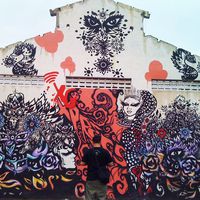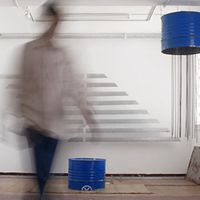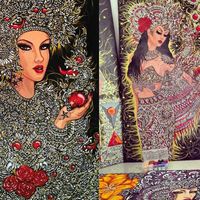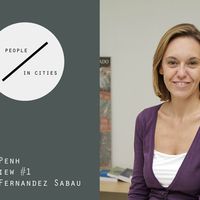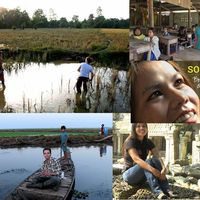Kon Len Khnhom: a shared living room for the arts in Phnom Penh

Art manager Meta Moeng is a soft powerhouse in the Cambodian art world. With the art space Kon Len Khnhom, she is allowing free and inspiring conversations to happen.
This January I embarked in a one-month research on the Cambodian contemporary art scene. During this time I interviewed a number of artists and art operators from different generations, to really get a snapshot of how the art scene is evolving.
What is interesting about the contemporary art scene in Cambodia is that you get the clear sensation of something that is in the process of being built from scratch. Every single individual that steps in, has the power to create huge change. A new independent art space is no “yet another independent art space” like it would be in, say, London or New York. In Phnom Penh a new art avenue might radically change the life of many individuals, shape their dreams, give a defined form to their aspirations.
However, it takes outstanding individuals to take up the challenge of putting down the foundations for something bigger to grow in the future. Something that can represent a sustainable present for the yet-to-become artists, the yet-to-become curators and the yet-to-become art critics in Cambodia.

It takes someone like Meta Moeng, founder of the art space Kon Len Khnhom. My bet is on this petite and strong-willed art manager, who I regard as the epitome of the modern Cambodian woman. I saw local parking assistants not even believing she was a Phnom Penh native, even though she would speak fluent Khmer to them.Jumping in the car with her, I thought that maybe this was because her short hair, or because of her comfortable but cosmopolitan look, or rather her gestures and attitude that revealed the big size of her dreams. A down-to-heart determined, practical individual, her approach to all things remains loving and caring.
While we were driving together to the studio of internationally acclaimed Cambodian visual artist Sopheap Pich, who she is assistant to, we started chatting about the talk I had at Kon Len Khnhom just a week earlier. I told her that I felt comfortable sharing my experiences in such a cosy atmosphere, which felt like a friend’s living room. The audience was a group of softly spoken people, whether art habitué, photo journalists or students, quietly sitting around on cushions.
During my month-long research in Cambodia I kept coming back to the space and felt welcomed at all time, if not by Meta itself, by the students hanging out in the place.
On the way to the studio, we shared our own experiences as freelancers working in the art world. We both noticed how the nature of our work would make us feel quite isolated at times from the rhythms of the “IRL society”. It wasn’t easy to find people on the ground who would share our interests and lifestyle. When I voiced these concerns, Meta replied from her heart: “Well, isolation is precisely the reason why I created Kon Len Khnhom. As a freelancer working in the art world, I craved connections. Instead of waiting for someone to create that space I wanted, I decided to create it myself. So people who are not necessarily interested in the arts, would kind of fall into it naturally, and become interested in culture.”

And this is precisely what happened to her. She wasn’t one that as a child was raving about art, but rather find this fertile ground almost by chance, and decided to cultivate it. A graduate in business management, in 2013 she was awarded a place on the Creative Leaders Programme, a competitive personal development program for arts managers offered by the arts organization Cambodian Living Arts. That brought her closer to the arts, and she then became a co-founding member of the Cambodian Arts Network (CAN).
She then started working at the independent art space SA SA BASSAC in Phnom Penh, becoming the Community Projects Manager: “Erin Gleeson, the Artistic Director of SA SA BASSAC, was the person who brought me to the Cambodia Visual Art world and thanks to her. Without her, I may not who am I right now.”
At the beginning of 2017 she felt it was high time for her to move on from that job and opened up her own space. Initially, she was simply looking for a quiet space for herself in the city, to meet with clients and do her freelance work as a consultant and artist’s assistant. But when she found a two-storey traditional wooden Khmer house, almost hidden in a silent alleyway near the Tuol Sleng Genocide Museum, she saw the potential for the space was much higher. An year later, Kon Len Khnhom is an active space for people and artists to gather and have discussions.
What compelled you to found Kon Len Khnhom?
The idea for Kon Len Khnhom came from both my head and heart. What I meant with head, is that I wanted to create a space for independent and free thinking. On the other hand by heart I refer to my passion; what I like to do. Head and heart are connected by the neck, which is a flexible part, and this is what basically Kon Len Khnhom represents.
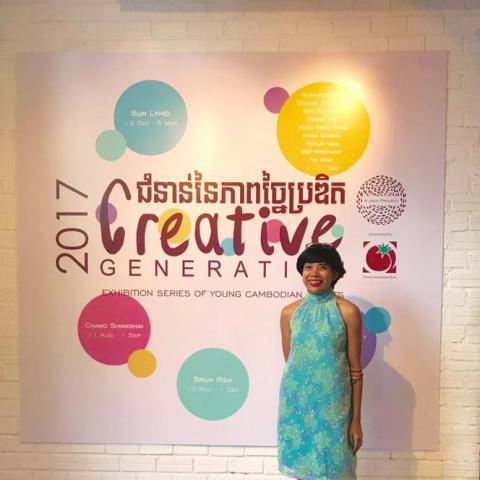
Though taking decisions for the art space and how to move forward might be the most challenging part, since I established Kon Len Khnhom I saw increasing connections and links through the different players in the art scene. It’s a totally different discussion, and more interesting events and shows are happening.
Your main aim is to grow the art audiences. Who is the public of the arts right now and how do you intend to grow it?
I am interested in growing audiences organically. Kon Len Khnhom is the door between the arts and audiences, which consist mostly in young people and university students. They might or they might not be directly interested in the arts, but it is important to expose them to new ideas related to culture. Learning without fear, being curious about what we discuss in the space with artists and art operators is highly inspiring to them. We don’t simply want to teach the public about the arts. We want to rather provide a place and resource which rotates around arts for people to feel something. Once those young people get the inspiration they may be ready to develop something of their own. I’m doing this kind of work hoping that gradually we will see more and more people understand and support the arts.
Can you tell us about some of the talks and events you held at Kon Len Khnhom that you are particularly proud of?
I’m so proud of the student-in-residence and creative-in-residence talks we organised. I found that really amazing things happen during and after those conversations, and this gives me so much hope for the future. It’s really the image of happiness for me, and I cannot stop smiling from my heart when I’m thinking about it. I also love having people from outside coming to have their talks at the space, as they bring a lot of understanding.

You recently founded Sthani Station, which is not directly connected to Kon Len Khnhom. Can you tell us about this new project and how it is coming together?
Sthani is a small store which I opened with the intention of creating a platform for a generation of creative young people to display their works and develop their skills. In addition, we will have events to connect them with the art community and public. There is a connection with Kon Len Khnhom, in that we have talks there and after that the public can drop by Sthani and see the products from a local designer or artists. By buying something they can support the artists/designers/markers and encourage them to produce new work.
What I’m really interested with creating a synergy of these projects is to have an impact and a legacy for the present and the future of the art community.
You are obviously a very busy person, and I find it amazing that you created a space where you don’t even have the chance to go every day, but you made available for all people to use freely. I remember you pointed out that Kon Len Khnhom in a way “deputise for you” – it’s a physical space making up for your physical presence. In that I see the idea of service – servicing the community – and also the idea of letting things grow by themselves. I’m wondering if this conception was there since the beginning, and if you ever struggled with the idea of letting go on control for Kon Len Khnhom?

Yes, this was the idea since the beginning, it was conceived as something that everyone interested in culture could use. Our slogan is “My home is yours”. Basically, I gave my keys to students and people who need the space, and once they got the keys they have to be responsible for the space. For me handing them the key means giving them my trust. And so far it worked marvels and also brought new faces and new people. Slowly, things happen without needing to have a tight control, and the community growths organically.
Naima Morelli is a journalist and arts writer researching emerging art systems. She is specialized in the Asia-Pacific region, focusing on Singaporean, Indonesian and Australian art and she is currently researching Cambodian contemporary art. Currently based in Rome and constantly on the go, she has the mission of bridging Asia and Europe through art, culture and words. Her pieces regularly appear on CoBo Social, Art Republik, Culture360, Art a Part of Culture and Middle East Monitor. In the past she has written for Art Monthly Australia, ArtsHub, NY Arts, Artribune, I-Magazine Bali, The Times of Malta among others, and she has contributed texts to a number of publications and exhibitions catalogs. She is also the author of the book “Arte Contemporanea in Indonesia”, a narrative essay published in Italy. The book shows how contemporary art produced in Indonesia can’t just be labelled as “Indonesian”, while tracking the context’s influences on the art itself.
Additional resources:
- Kon Len Khnhom: https://www.facebook.com/KonLenKhnhom/
- Sthani.station: https://www.facebook.com/sthani.station/
- Cambodian Arts Network – CAN: https://www.facebook.com/CambodianArtsNetwork/
- Cambodian Living Arts: https://www.cambodianlivingarts.org/
- Meta Moeng, a bridge-builder in Cambodia’s art world: https://artsequator.com/meta-moeng/
- Meta Meong and Kon Len Khnhom, and Erin Gleeson and SA SA BASSAC in Phnom Penh: http://www.luxuo.com/culture/art/field-of-dreams-meta-moeng-at-phnom-penh-cambodia.html
Similar content
16 Jan 2017
16 Jun 2014
09 Jul 2015

